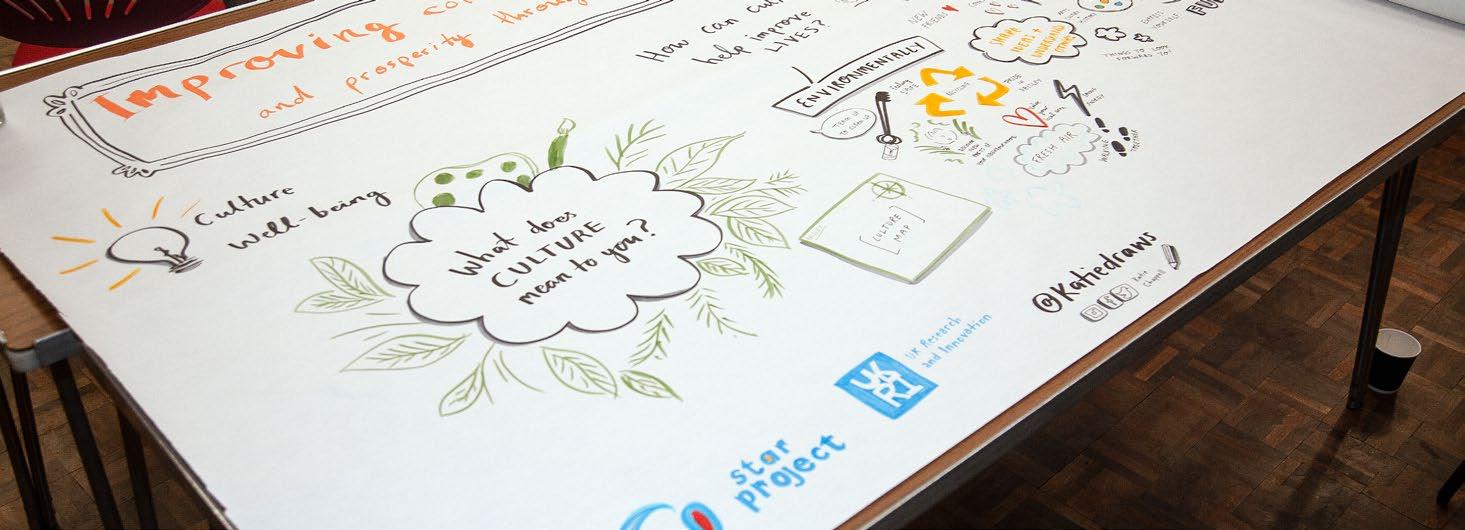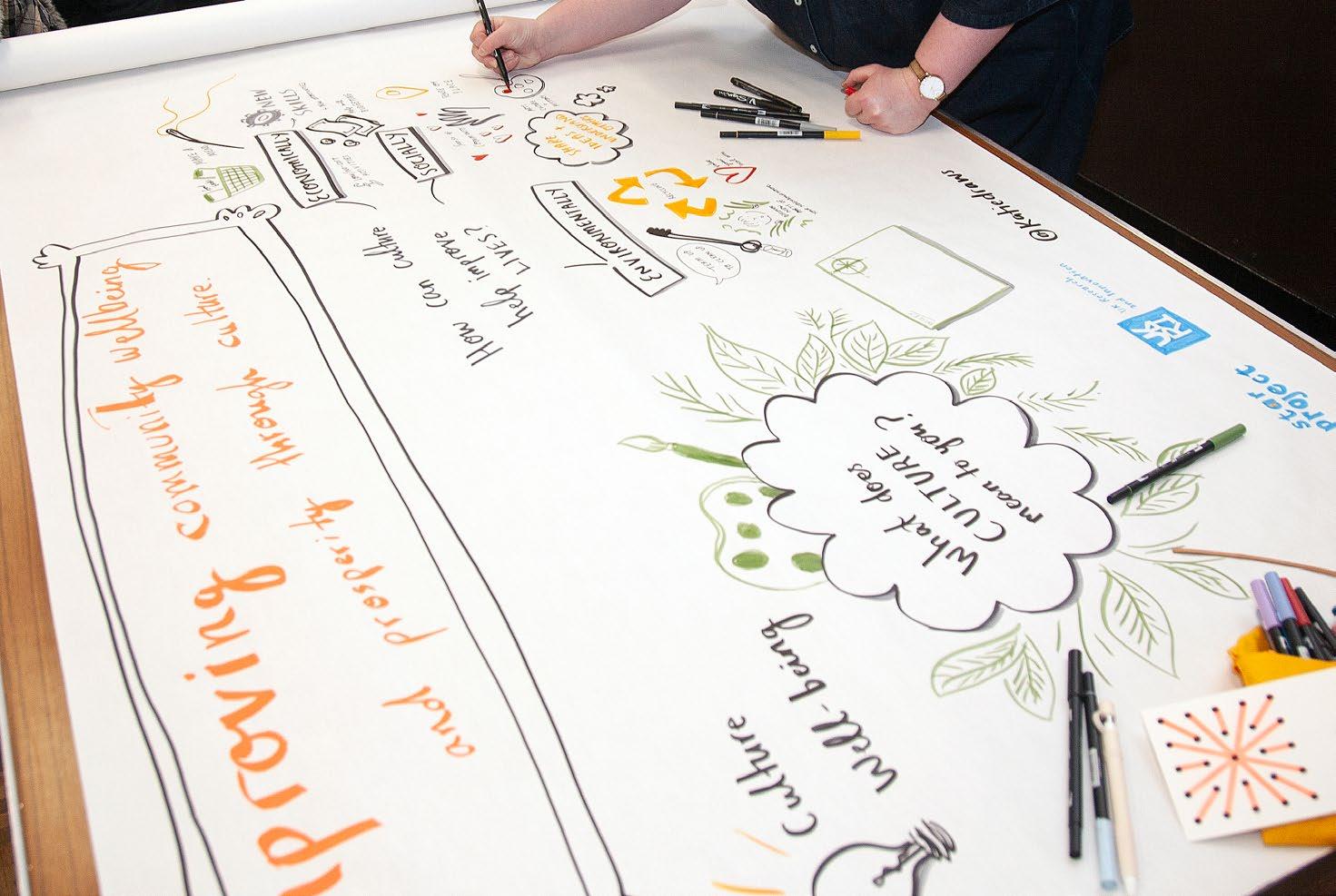Matarasso (2017) advocates for co-creation as a mode of production (c.f. participation), noting that ‘an artist intending to co-create […] has to find ways to disperse the power associated with their skill, knowledge, experience and position.’ A transition from hierarchy to network based working denotes a democratisation of production is the crucial step to realising the potential of culture in this space (coproduction) (Matarasso, 2017). UK based examples of projects and interventions which seek to address elements of material poverty and local community agency include Home Baked17 in Liverpool and Slung Low18 located in Leeds. The Welsh government’s Fusion Programme comprises a foremost example of a formal, executive-led intervention prioritising a recognition of material poverty in the manner we have described. Homebaked is ‘a community land trust and co-operative bakery situated on the boundary between the neighbourhoods of Everton and Anfield, just opposite the Liverpool Football Club’ that began life as 2up2down; was part of Liverpool Biennial. The undertaking employed an artist to facilitate local community reflection on what people wanted to do for themselves in the wake of a failed housing market regeneration initiative and, longer term, to take some decisions with regard to creating economic opportunity. As a business co-owned and staffed/run by locally resident community members, the bakery has hard economic outputs which benefit the local community in addition to the civic and social value it brings to the community. Homebaked pays the living wage, reinvesting profits into local economy. There work is, they say, ‘based on the simple belief that we all deserve to live well. For us, that means good jobs, secure homes, great food and welcoming spaces to meet, share stories, learn and celebrate’. Slung Low has been operating since 2000, it is ‘an award-winning theatre company specialising in making epic productions in non-theatre spaces, often with large community performance companies at their heart’. Slung Low run a working men’s club, a college and a woodland. They have been closely involved in supporting vulnerable community members during the COVID19 lockdown. Paying hourly work at the living wage, much of their work is shown on a ‘pay what you decide’ basis; their space and equipment can also be hired thus. The Slung Low approach foregrounds a very specific and committed set of values with regard to income inequality and a specific set of mechanisms through which this might be addressed. Economic transparency and equality is central to Slung Low’s ethos (they operate a horizontal wage structure). Their work seeks to address issues of access for the economically excluded along with activity aimed at the amelioration of urgent problems arising directly from material poverty (i.e. lack of food). Building on the recommendation of Baroness Andrews’ 2014 report – Culture & Poverty, Response by the Welsh Government: harnessing the power of the arts culture and heritage to promote social justice in Wales – Fusion is a M(useums), A(rchives) and L(ibraries) D(ivision) led initiative to ‘provide cultural activity that can help tackle poverty’ (Welsh Government, 2019:4). Within the framework of a national programme, Fusion prioritises partnerships at the local level as the most efficacious way to delivery ‘genuine collaboration and better outcomes’ (Welsh Government, 2019:4). In the period 2015-17, over 5,000 people participated in Fusion’s activities alongside 150 partner organisations comprising local authorities, theatres, heritage organisations, schools, museums, libraries and archives. Over 100 people were assisted in gaining qualifications (i.e. through the Cultural Ambition programme 19), 300 volunteering opportunities were created and 1,500 school aged children were supported to achieve better educational outcomes (Welsh Government, 2019:4). Data gathered from across the Fusion projects clearly evidences outcomes that positively affect participants’ employment prospects as well as those that speak to a wellbeing agenda: Table of Fusion Indicators (Welsh Government, 2019:5)
Fusion Indicator
17-18
18-19
F1 Supporting early years & family learning
4979
13087
F2 gaining a qualification
423
720
F3 Regular volunteering as a route to work
332
761
F4 Completing a work experience placement
110
160
F5 Improved digital skills
50
997
F6 Improved attitude to formal learning
2689
3046
F7 Better able to manage mental wellbeing and physical health
2941
5400
http://homebaked.org.uk/ https://www.slunglow.org/ 19 This programme supported 33 young people to achieve NVQ level 2 Cultural Heritage qualification having previously been not in education, employment or training (Welsh Government, 2019:6). 17
18
13







